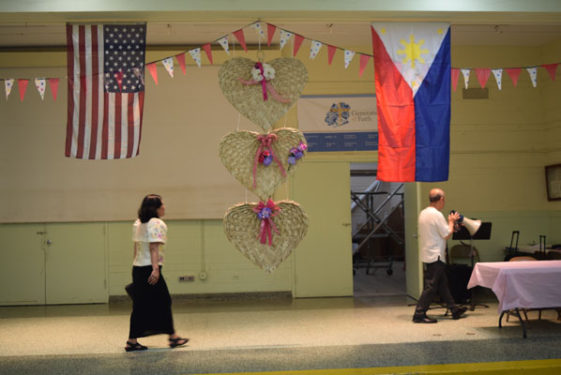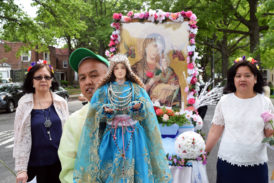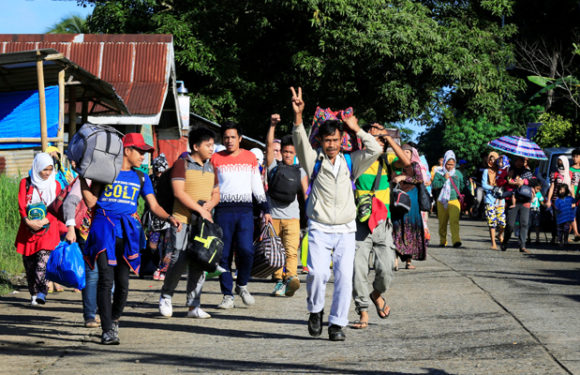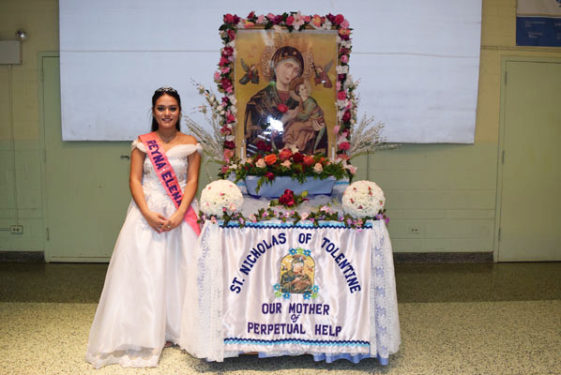
Just days after Philippine President Rodrigo Duterte declared martial law on a southern island of the country to deal with the threat of radical Islamist militancy, the Filipino community at St. Nicholas of Tolentine, celebrated Santacruzan, a historical pageant traditionally held in the Philippines.

Not every Sunday afternoon will certain streets of Jamaica, Queens, be closed in order for a Filipino pageant to take place. But along Goethals Ave. May 28, a colorful procession took center stage when passers-by heard the rosary recited over a moving speakerphone and witnessed young Filipino girls dressed in angelic white-feathered wings and flowered halos walking beside a row of young Filipino boys in traditional thin-rice paper barong button-ups.
With more than 80 percent of the Philippine population belonging to the Roman Catholic faith, religious traditions have embedded the very fabric of the country’s culture. For Filipinos celebrating Santacruzan, the joyful celebration of thanksgiving dates back hundreds of years, honoring the time when Reyna Helena, the mother of Roman emperor Constantine the Great, recovered the True Cross of Jesus. The colorful procession re-enacted the historical event. Yet, it was also inspired by Constantine’s life. The emperor is credited with religious accolades that included ending the persecution of Christians throughout the Roman Empire.
Santacruzan took place just days after Philippine President Duterte declared martial law on the southern island of Mindanao, to deal with the threat of Islamist militancy that included the taking hostage of a Catholic priest and several churchgoers in the city of predominantly-Muslim Marawi.

Father Godofredo Felicitas, parochial vicar at St. Robert Bellarmine, Bayside, has direct ties to the area in the Philippines where the civil unrest occurred. He was ordained in the Diocese of Iligan, one of Mindanao’s subregions. He also had concelebrated a Novena Mass with Father Teresito Suganob, the priest from the Prelature of Marawi, who is being held captive by Islamist extremists after they reportedly burned down his church, St. Mary’s Cathedral.
Father Felicitas described the priest and professor of Mindanao State University.
“He’s a nice guy who has been exposed to the Lanao area for years right after ordination,” said Father Felicitas. “Marawi is just 10 percent Christian, so when you enter, the feeling is that it’s not part of the Philippines. It’s really an Islamic city.”
Father Felicitas has been keeping in close contact with parishioners from the Diocese of Iligan, his former diocese that neighbors the Prelature of Marawi. He said because of Marawi’s mountainous landscape, people must travel into Iligan City in order to purchase food and other resources. Father Felicitas has been told that the security checkpoints were initiated there since the martial law declaration May 25.
Yet, he said peace had been prevailing between the two areas, since the Prelature of Marawi used to be a part of the Iligan diocese.
“During the time of the first bishop of Iligan, it was changed into the Prelature, and some of (the bishop’s) workers were Muslim,” he recalled. “There was a Muslim-Christian dialogue with the theme of building bridges and breaking down walls.”
Filipinos Impacted in America
While those Filipinos who gathered at the Queens church were able to witness to their faith, celebrate Mass and gather together for food and fellowship, the thoughts of participants were on the conflict back home.
For Maria Enriquez, who took part in the pageant as Reyna Elena, celebrating her culture and faith brought her joy, but she was also torn about the violence.

“I feel good but at the same time my heart is actually all over the place,” said Enriquez, a parishioner at Our Lady of Lourdes, Queens Village. “My own motherland and it’s not just Filipinos (affected), it’s Muslims. They’re all humans. Everyone is human. It’s just heartbreaking for everyone.”
Bobby Consuegra has helped organize Santacruzan at St. Nicholas of Tolentine for more than 21 years. Being from Mindanao, he’s familiar with the headlines from his homeland.
“I really feel bad because God said that everyone is a child of God,” Consuegra said while overlooking a Philippine and American flag hanging in the auditorium.
“We may differ in religion, but we are one. We are brothers and sisters. I was really surprised. For me, I just pray to God that everything will be fine. I’m hoping everyone will agree with each other.”
His wife, Tess Consuegra, from the capital city of Manila, north of her husband’s island, said her solace comes from her faith. “Back home it’s supposed to be a Catholic country, but then it’s weird that it’s being challenged,” she said. “We just have to really show our faith and be assertive in what we believe.”
Related: Currents NY episode “Local Priest Worries About Troubles Back Home”





























